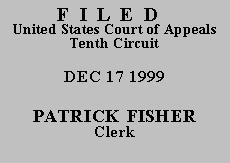

| BILLY DEON BUTLER, | No. 99-7090
(D.C. No. 97-CV-394-B) |
Following his jury conviction in Oklahoma state court for second-degree burglary after former conviction of two or more felonies, Butler was sentenced to serve 150 years in prison. He filed an appeal, and the Oklahoma Court of Criminal Appeals affirmed his conviction in July 1996. He then filed a petition for a writ of habeas corpus with the federal district court pursuant to 28 U.S.C. § 2254, alleging three claims: (1) the evidence was insufficient to support his conviction for second-degree burglary; (2) the 150-year sentence was excessive; and (3) his motion to dismiss for lack of a speedy trial should have been sustained. Finding that Butler had exhausted his state remedies, the district court dismissed his claims on the merits. Because Butler has not made a substantial showing of the denial of a constitutional right, we deny his request for a certificate of appealability. See 28 U.S.C. § 2253(c).
In his application for a certificate of appealability, Butler brings two claims: (1) he received ineffective assistance of counsel due, inter alia, to an alleged conflict of interest on the part of his attorney and inadequate performance at trial; and (2) the evidence was insufficient to support his conviction for second-degree burglary.
"[A] federal appellate court [will] not consider an issue not passed upon below. Consequently, when a litigant fails to raise an issue below in a timely fashion and the court below does not address the merits of the issue, the litigant has not preserved the issue for appellate review." FDIC v. Noel, 177 F.3d 911, 915 (10th Cir. 1999) (citations and internal quotations omitted). In the present case, Butler failed to raise his ineffective assistance of counsel claim in the district court. We will not consider it here and dismiss the claim without prejudice.
With regard to Butler's insufficiency of the evidence claim, Butler alleges that the primary evidence upon which the jury relied in convicting him was unreliable because it was furnished by an accomplice in exchange for a more lenient sentence. In challenging the sufficiency of the evidence, "defendants are faced with a high hurdle." United States v. Voss, 82 F.3d 1521, 1524 (10th Cir. 1996). We view the evidence, and the reasonable inferences to be drawn therefrom, in the light most favorable to the government to determine whether any rational trier of fact could have found the essential elements of the crime beyond a reasonable doubt. See United States v. Jones, 44 F.3d 860, 864-65 (10th Cir. 1995). The credibility of witnesses is for the jury to evaluate. See United States v. Davis, 965 F.2d 804, 811 (10th Cir. 1992). Moreover, under the Anti-terrorism and Effective Death Penalty Act of 1996 ("AEDPA"), all factual findings of the state court are presumed correct unless the petitioner can rebut this presumption by clear and convincing evidence. See 28 U.S.C. § 2254(e)(1); see also Houchin v. Zavaras, 107 F.3d 1465, 1470 (10th Cir. 1997) ("AEDPA increases the deference to be paid by the federal courts to the state court's factual findings . . . ."). In the present case, the trier of fact and the Oklahoma Court of Criminal Appeals chose to accept as credible the testimony furnished by Butler's accomplice, convicting Butler on that basis. In light of Butler's purely conclusory allegations that the jury's evaluation of the evidence was unreasonable, we will not second-guess the jury's credibility determination here.
A certificate of appealability is DENIED. This matter is DISMISSED.
The mandate shall issue forthwith.
ENTERED FOR THE COURT
Carlos F. Lucero
Circuit Judge
*.The case is unanimously ordered submitted without oral argument pursuant to Fed. R. App. P. 34(a)(2) and 10th Cir. R. 34.1(G). This order and judgment is not binding precedent, except under the doctrines of law of the case, res judicata, and collateral estoppel. The court generally disfavors the citation of orders and judgments; nevertheless, an order and judgment may be cited under the terms and conditions of 10th Cir. R. 36.3.